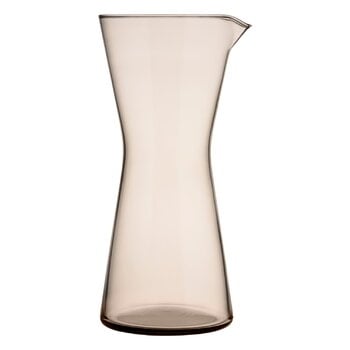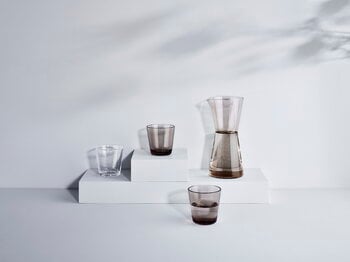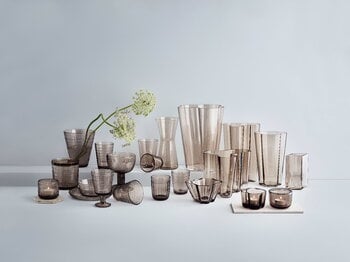Iittala’s Kartio pitcher is part of the eponymous glassware collection designed by Kaj Franck. Kartio’s unique character comes from the living spirit that Franck has managed to add to the rational, clean geometry. The Kartio collection is a fine example of Finnish glass design: its simple practicality suits the needs of everyday life, and its refined elegance complements also festive settings. The glass pitcher, along with the entire Kartio collection, is a Nordic design classic that stands the test of time and use.
Kartio pitcher 95 cl, linen
Iittala
Description
Iittala’s Kartio pitcher is part of the eponymous glassware collection designed by Kaj Franck. Kartio’s unique character comes from the living spirit that Franck has managed to add to the rational, clean geometry. The Kartio collection is a fine example of Finnish glass design: its simple practicality suits the needs of everyday life, and its refined elegance complements also festive settings. The glass pitcher, along with the entire Kartio collection, is a Nordic design classic that stands the test of time and use.
Product details (5)
- Material
- Glass
- Colour
- Linen
- Height
- 220 mm
- Capacity
- 95 cl
- Care instructions
- Wash by hand
- Product ID
Designer
Finnish ceramic and glass designer Kaj Franck (1911-1989) realized a powerful truth in his distinguished career: simple is beautiful. Despite the world moving at an ever-fastening pace, from one decade to another, that simple truth remains. Franck’s inspiration and principles began a tradition in Finnish design, which is still alive and strong today. His best-known works are Iittala Teema and Kartio series, and his heritage is a part of every Finnish home.
Read moreReviews (0)
Sustainability
The Product Sustainability Framework, our criteria of sustainable design, helps you find the most sustainable products in our selection. Read below which sustainability criteria this product has met.
Working conditions & labour 8/9
-
Equal opportunities for all employees
-
Commitment to UN Global Compact, fair compensation for all employees
-
Corporate responsibility requirements defined and communicated for suppliers
-
Systematic work for improved inclusion and well-being in the workplace
-
Transparent supply chain
-
Suppliers' compliance to a code of conduct ensured
-
Compliance to the UN Guiding Principles on Business and Human Rights ensured in the supply chain
-
Support for community involvement in the supply chain
Eco-friendly production 7/9
-
Fair and resource-wise water-use in production
-
No incineration or landfilling of returned items
-
No use of endangered species as materials
-
No direct environmental emissions or waste (excl. GHGs) from production
-
The sustainability of direct suppliers' production is addressed and monitored
-
Material-efficient and ecological packaging
-
Positive impact on nature’s well-being through operations that regenerate natural ecosystems
Climate impact 5/8
-
Company's direct greenhouse gas emissions identified and commitment to reduction
-
Product's carbon impact identified and commitment to reduction
-
Guidance on energy- and eco-efficient use of the product
-
Contribution to climate initiatives beyond the brand’s direct operations
-
Low-carbon or compensated transportation
Sustainable materials 4/6
-
Sustainable and long-lasting material choices
-
No harmful or hazardous substances
-
Responsible raw material sourcing and production
-
Ecological materials: natural, biodegradable, recyclable or recycled contents
Circular design 4/5
-
High aesthetic quality promoting long-term use of the product
-
Technically durable product design and material choices
-
Design for enduring life-long quality
-
Innovative circular design solutions: circular service system, resale platform, remanufacturing, collection of used products, etc.











